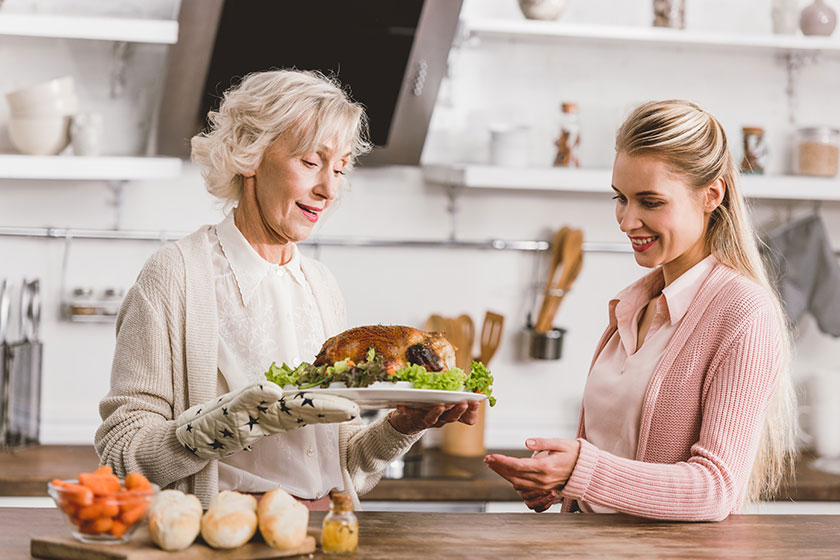As we navigate the journey of caring for our loved ones with dementia, one of the challenges we often encounter is helping them with cooking. Cooking is not just about preparing meals; it’s a meaningful activity that connects us to our memories and emotions. For seniors with dementia, it can be a particularly challenging task due to cognitive changes and safety concerns. In this article, we will explore five practical strategies to support your loved ones in the kitchen while ensuring their well-being.
Simplify the Cooking Process
Cooking can be a complex activity, requiring the ability to follow recipes, multitask, and remember various steps. For seniors with dementia, these cognitive functions can become impaired, making it essential to simplify the cooking process.
Start by selecting recipes that are straightforward and have minimal steps. Choose dishes with basic ingredients and fewer complex techniques. This not only reduces the cognitive load but also minimizes the risk of accidents in the kitchen.
Additionally, consider using visual aids to support the cooking process. You can create step-by-step visual guides with images and simple instructions for each task. These visual cues can help your loved one follow the recipe more easily.
Supervise and Cook Together
Cooking together can be a wonderful way to bond with your loved one while ensuring their safety in the kitchen. It provides an opportunity for shared experiences and maintains their sense of independence.
When you cook together, be actively present in the kitchen. Your role is to provide guidance, offer support, and step in if necessary. Encourage your loved one to participate in tasks they can handle safely, such as stirring, measuring ingredients, or setting the table. This involvement not only keeps them engaged but also boosts their self-esteem.
Communication is crucial during this collaborative cooking process. Use clear and simple instructions, and be patient if your loved one takes a bit longer to complete a task. Celebrate their contributions and acknowledge their efforts to boost their confidence.
Implement Kitchen Safety Measures
Safety should always be a top priority when seniors with dementia are in the kitchen. Cognitive changes can lead to forgetfulness and confusion, which may result in accidents. To prevent potential hazards, it’s essential to implement various kitchen safety measures.
Start by keeping potentially dangerous utensils like knives, blenders, or sharp objects out of reach when they are not in use. Lock cabinets containing such items or install childproof locks to prevent access.
Additionally, closely supervise the use of kitchen appliances. Ensure that your loved one knows how to operate them safely, and double-check that they are turned off after use. You can also consider replacing older appliances with newer models that have automatic shut-off features for added safety.
To further enhance safety, disable appliances when they are not in use. This can be done by unplugging them, removing fuses or knobs, or finding safety devices that prevent the appliance from being turned on accidentally.
Regularly Check for Spoiled Foods
Seniors with dementia may struggle to remember to check for expired or spoiled foods in the refrigerator or pantry. This forgetfulness can lead to health risks if they consume spoiled items. To ensure their nutrition and well-being, take on the responsibility of regularly inspecting their food storage areas.
Set a schedule for checking the fridge and pantry, and stick to it consistently. Look for expired items, spoiled fruits or vegetables, or any signs of mold or contamination. Remove any unsafe items and replace them with fresh, safe alternatives. Consider organizing the pantry and fridge in a way that makes it easier to identify and access items. Labeling shelves or containers can help your loved one locate what they need and reduce confusion.
Seek Alternative Meal Solutions
As dementia progresses, there may come a point when your loved one can no longer safely prepare meals independently. In such situations, it’s essential to explore alternative meal solutions that prioritize their well-being and nutritional needs.
One option is to consider meal delivery services specifically designed for residents or individuals with dietary restrictions. These services provide pre-cooked, nutritious meals that can be easily reheated, eliminating the need for cooking. They offer a convenient and safe way to ensure your loved one receives proper nutrition.
Another alternative is to rely on pre-made meals that require minimal preparation. These meals are available in most grocery stores and come in various options, including frozen or ready-to-eat dishes. They can be a practical solution for days when cooking is not feasible.
If you’re seeking compassionate and professional support for your loved one with dementia in Harrisburg, consider reaching out to TerraBella Harrisburg. Our dedicated team is here to provide the care and guidance your family needs. Contact us today to explore how we can assist you on this journey of care and support.







